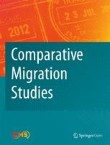Volumes 1 and 2 of Comparative Migration Studies are available here
Behind the scenes: family involvement and educational achievements of second-generation Turks in Austria, France and Sweden
This article explores school-related involvement strategies within Turkish families in Austria, France and Sweden and their linkages with educational achievements of their children. Using data from the TIES su...
